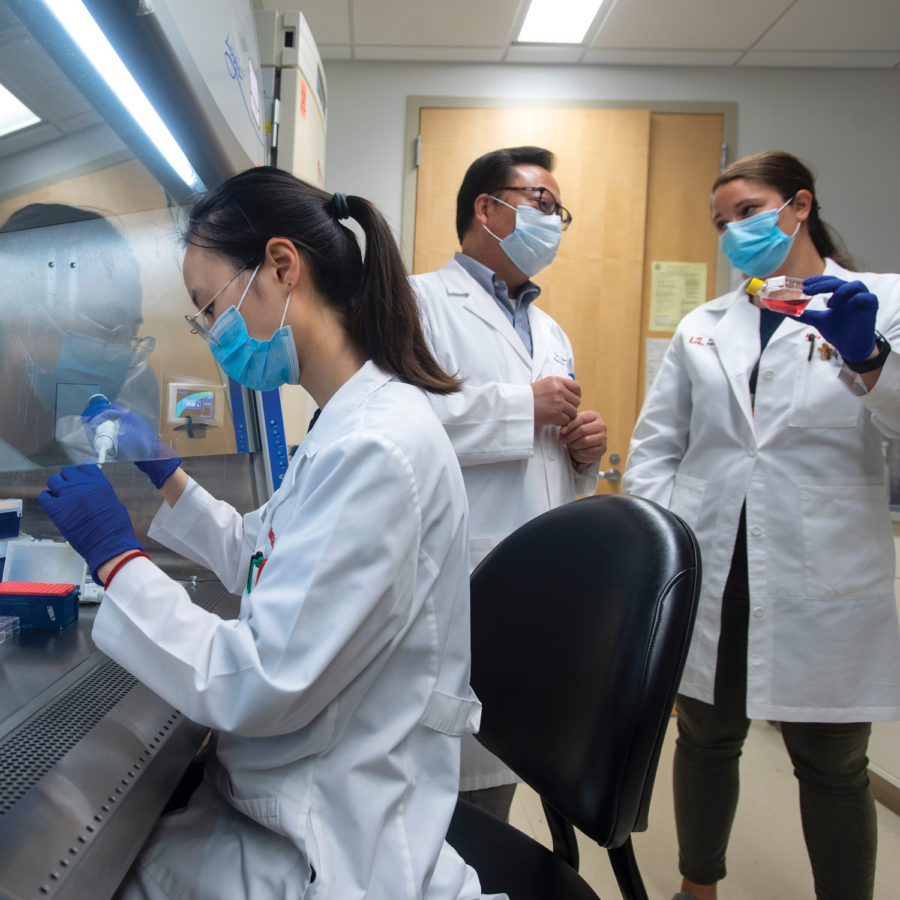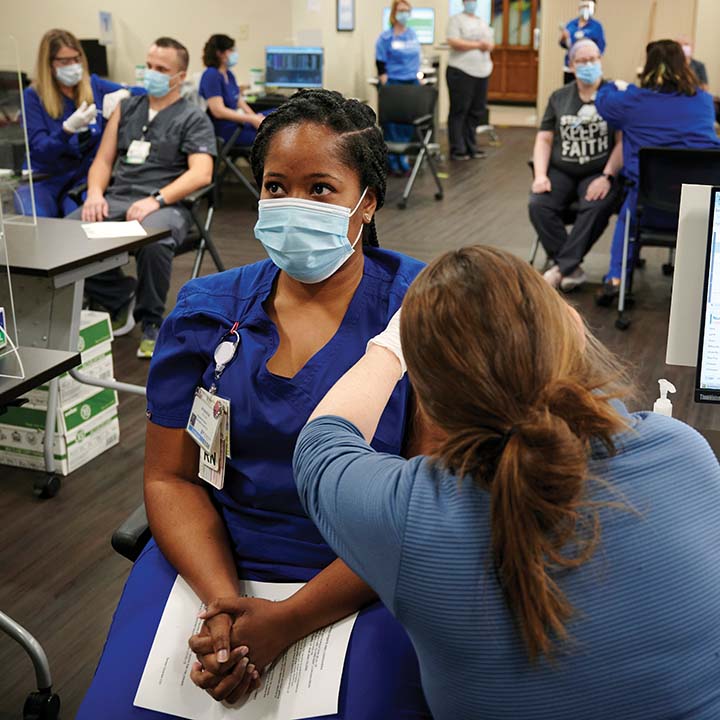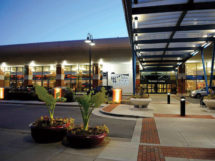 It’s been a tale of two years. Last spring, Baptist Health Louisville President Larry Gray sent out daily staff communications, updating ever-changing information and assuaging anxiety about the number of COVID 19-positive patients.
It’s been a tale of two years. Last spring, Baptist Health Louisville President Larry Gray sent out daily staff communications, updating ever-changing information and assuaging anxiety about the number of COVID 19-positive patients.
Now he sends weekly updates. In mid-May 2020, there were 22 patients being treated by Baptist Health Louisville for the virus, at the time considered a large number, he said. At the same point this year, 12 patients with COVID-19 were receiving care.
“Between those data points a year apart, it doesn’t tell the story of what happened in the intervening time,” he said.

What did happen? In the year between those statistical bookends, fall 2020 saw a high of 105 COVID-19 patients at Baptist Health Louisville, out of almost 2,500 total treated last year.
Response to the deadly pandemic was the pivotal event health care systems – and the world – grappled with last year, and though lower in number now, new cases still arise.
Health care systems also experienced some triumphs, with staff at all levels performing admirably under unforeseen and unthinkable pressures, and new construction projects and technologies enabling greater efficiency and more patient-centered care, Greater Louisville-area hospital officials say.
Gray said he’s abundantly grateful for employees’ resilience, from nurses to physicians, food service, radiology technicians, therapy professionals and more. Some retired nurses and other staff returned to help with vaccination clinics.
He’s also thankful for the rich health care resources and collaborative spirit among Baptist Health, UofL Health and Norton Healthcare over the past year.
“We compete in good ways, of wanting to expand services and so forth, but through the pandemic, we found ways to collaborate,” Gray said.
Those efforts included weekly meetings among all three systems’ leadership, he said, with input from those dealing with patient flow and securing ample personal protective equipment (PPE). Surge plans were shared, and discussions ensued about transferring patients among hospitals as needed.
“Everybody was concerned about doing the right thing for our community,” he said.
UofL Health CEO Tom Miller said “health care heroes” is a relatively new term that applies to all caregivers and staff there who many times put themselves at risk during the pandemic, implementing new safety measures, securing PPE and quickly assembling mass testing and vaccination sites.
“Coming to work in the center of this universe that was COVID took a tremendous amount of effort from people,” he said.
The public also rallied to help, he said, with donations of food and comfort items to caregivers and encouraging signs made to boost their spirits. A local computer company provided tablets so patients could still communicate with loved ones.
Norton Healthcare President/CEO Russell F. Cox said all Louisville health care providers and systems worked together like never before. Cox expressed great pride in his team.
“We had just a phenomenal response,” he said. “You know the people in health care don’t just choose careers, they’re answering a call … that call really got tested a whole lot during the pandemic.”
New technologies, investments
A change in mindset that resulted from all the uncertainty is yielding positive results, Cox said, which is the embracing and faster implementation of new technologies like telemedicine, now an option for about 700 Norton providers and 140 locations. It’s now used in both primary care and about 30 specialty fields, expanding access to patients in underserved areas or who otherwise have barriers to having in-person appointments.

Cox said the goal is to keep this spirit of innovation alive.
“At the end of the day it’s better for us, better for our patients and better for the community,” he said.
Other investments in new technologies and capital projects took place in 2020.
At UofL Health, breakthrough immunotherapy treatments help use the body’s own resources to fight cancer at the Brown Cancer Center, drawing in patients from across the Southeast, Miller said.
Patients from across the world come to the Frazier Rehabilitation Institute for the latest in spinal injury treatments, he said.
Five robots perform minimally invasive surgeries in neurosurgery, orthopedic, cancer and spinal procedures, and a sixth robot is being considered.
“The ability for us to use robotics for minimally invasive surgery is just exploding for us,” he said.
KentuckyOne Health was integrated into UofL Health last year, adding 5,000 associates into the organization, Miller said, and necessitating systemwide IT upgrades.
Brown Cancer Center has undergone an expansion and UofL Health and Kindred Health have combined forces to build a 50,000 s.f., two-story inpatient rehabilitation facility with 40 beds near the intersection of I-71 and I-265. It was also announced in March 2021 that 40 to 60 inpatient beds will be added to UofL Health – Medical Center South in Shepherdsville.
In addition, new Urgent Care Plus clinics are coming to underserved areas of Greater Louisville, he said.
In all, Miller said $80 million was spent in capital projects in 2020 and about $60 million is to be invested this year. One goal is to provide all-private patient rooms; currently, about a third are semiprivate.
Highlights for Baptist Health Louisville include a new interventional radiology suite at its main hospital with expansion capabilities, a 30-bed observation unit to open this fall to more closely monitor patients who need it, and relocation of a few departments, including administration, Gray said.
A new and relocated education center was slated to open in late May, freeing up space for surgery suite expansion and connecting ambulatory and inpatient surgery suites. That project should be completed by early 2023.
“Now that the pandemic is easing a little, we are able to make these moves,” Gray said.
Baptist Health Hardin in Elizabethtown was integrated into medical and clinical documentation systems for increased medical records transparency among facilities.
Construction for a new primary-care center on Breckenridge Lane is under contract, providing additional OB/GYN, ambulatory surgery and outpatient diagnostic services, he said. Baptist Health Louisville’s gyno-oncology and cardio-oncology programs are forming new collaborations.
And parent organization Baptist Health partnered with Dallas-based Intuitive Health to bring the first hybrid emergency room and urgent care clinic in Southern Indiana to Jeffersonville. The full-service ER will be staffed with board-certified, ER-licensed physicians and equipped with on-site lab equipment and a radiology suite with X-ray and CT scanners.
Norton recently opened its relocated and expanded CPA Lab, a 46,000-s.f. facility on Breckenridge Lane. The $20.5 million project features $7 million in new equipment and enables consolidation and enhancement of clinical laboratory resources, technology and other services. The lab will support all of Norton’s facilities in Greater Louisville and a total of more than 800 medical partners throughout Kentucky and Southern Indiana.
When it comes to investing in new technologies, “What I try to focus on is, ‘What is the process that improves the outcomes for these people?’” Cox said.
New partnerships abounded for Norton Healthcare, including an outpatient rehab partnership with KORT. Another effort with Nashville-based LifePoint Health is helping smaller hospitals increase services, and a relationship in Southern Indiana with King’s Daughters’ Hospital has facilitated oncology and other collaborations.
Norton contributed $5 million to the Louisville Urban League’s West End sports complex, which was named the Norton Sports Health Athletics and Learning Complex. The facility’s goal is to extend services to disadvantaged communities. Norton also contributed $1.2 million to Simmons College of Kentucky in West Louisville to invest in faculty and student wellness.
During the rest of 2021, the battle to completely vanquish the virus will continue, Cox said, as will efforts encouraging those who put off routine medical checkups, immunizations or tests to return.



















